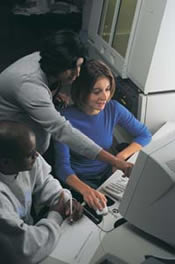"Hello? Is anybody out there?"
Posted by Malcolm Hays
 I was steered towards a web site hosted by Illinois Online Network that offers a number of general and specific strategies for promoting online communication among students.
I was steered towards a web site hosted by Illinois Online Network that offers a number of general and specific strategies for promoting online communication among students.
The General Strategies page discusses some common-sense approaches to engaging students in online communication. Ironically, students often have much more experience at online communication than many of their instructors, simply because the students immerse themselves in social networking sites like Facebook. However, they do not necessarily have any experience with directed online communication, which is where the instructor enters into the conversation. The real challenge is to inspire students to provide meaningful commentary about a discussion topic instead of, "Hey! What’s up?"
One key general strategy is to make the tone of the online lecture more conversational than academic. Academics (I am speaking generally here, so please don’t be offended) can often be somewhat long-winded when they are discoursing on their favored topic, particularly when writing for peer-reviewed academic journals that have rigorous academic standards that must be adhered to. Students don’t really have much patience for this type of rhetoric, especially if they are really trying to understand a concept. It is often much more helpful for students to receive an explanation in terms that they can understand. They need to gradually be introduced to the discourse conventions of their discipline over time instead of having it hit them in the face at 70 mph. I definitely favor a more conversational tone in my writings, whether online or even in my research papers.
The Specific Strategies page lists several activities you can use to help get your students "in the mood" for online conversations. For instance, the author of the page suggests breaking the ice by providing students with a brief biographical sketch of yourself. Students should be encouraged to do the same. There should probably be a few guidelines provided to keep students from revealing too much about themselves, but everyone has something interesting to say about themselves. Discussion questions can be assigned to specific students (they may even be drawn from students whose biographies may tie into the course somehow — for instance, I know a chemical engineer who had considerable experience working with measuring properties of oil long before he became a chemical engineer). One of my professors had all of us students do a "scavenger hunt" in the Library to find resources that concerned our discipline. We then had to post our finding on a Blackboard discussion board and comment on each other’s findings. A similar project might be to have students find online resources for their discipline and then have the students evaluate the "worthiness" of that resource. For example, Wikipedia is often derided as an unreliable resource–which is often true for controversial topics. However, Wikipedia can lead a researcher to other resources which are peer-reviewed and reliable.
I’ve never had the opportunity to take a distance course, though I have friends and colleagues who have taken online courses. They seem to appreciate the asynchronous learning because they can devote time to the course on their schedule instead of on the professors (as long as they meet the instructor’s expectations, of course–I imagine it is just as bad to get behind in an online course as in a face-to-face course). I have had at least one instructor use Blackboard to try and keep us engaged with the course material outside of class time, in addition to our usual reading assignments. Not entirely sure how successful the attempt was. Although everyone in the class did participate, we didn’t seem to offer much more than the instructor required and didn’t try to spark our own conversations about the material. This may be because we were able to interact with each other face-to-face.